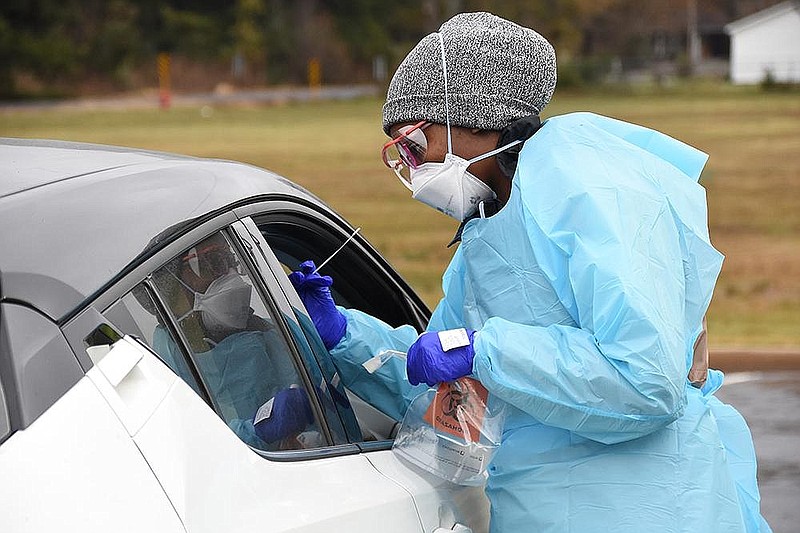The millionth case of covid-19 in Arkansas was reported by health officials Wednesday -- a little more than three years since the first case was documented in the state.
On Wednesday, the state reported it has tracked 1,000,333 cases of covid-19 overall since the start of the pandemic in March 2020. There were 368 new cases reported on Wednesday.
The number of covid-19 cases is likely higher, as at-home testing became widely available last year.
Then-Gov. Asa Hutchinson reported the first case of covid-19 in Arkansas on March 11, 2020. At the time the case was "presumptive" but it later became confirmed. The patient tested positive while receiving treatment at Jefferson Regional Medical Center in Pine Bluff.
A week later, schools in the state were closed, as were the Arkansas Supreme Court and casinos.
The deaths of two victims in the state were reported a little over three weeks later, on March 24.
One year after the first case, there were 5,500 deaths from the virus. As of Wednesday, a month shy of three years, there have been 12,936 deaths reported.
The first vaccines also became available to a majority of the public about one year after the first case.
"It is a sobering milestone to me," Robert Hopkins, director of the division of general internal medicine at UAMS, said about the 1 million mark. "Over the past three years, we have had a lot of trauma to our society and to our healthcare system. We are not having the high rate of hospitalization and deaths as we did early on in the pandemic, but it's sad to see it is still affecting Arkansans every day."
The medical community around the world and in Arkansas have learned a lot about viruses since the start of the pandemic, Hopkins said.
"As we started out in March 2020, there was a lot of fear," Hopkins said. "There were so many unknowns. We were just trying to figure out what our place was going to be in Arkansas. How can we respond to this? Could we set up a testing program quickly?"
Going forward there's hope that vaccine and anti-viral developments will be better, Hopkins said. He said surveillance learned during the pandemic can now be used for other viruses.
Gene Shelby, Garland County Health Officer, echoed Hopkins' thoughts.
"We will be able to track virus spread a lot quicker," Shelby said. "We've learned about the mechanism of transmissions and the way they can mutate. We've learned a lot in terms of following these things."
The state is in a better place than it previously was with covid-19 but there's still an impact on the state, he said.
"It continues to cause disease and deaths," Shelby said. "It has created a lot of pain and heartache for lots of people."
Long covid will continue to be a reality for some people as well, Shelby said.
"There will be a group of people who survived covid but will be disabled," Shelby said.
John Vincent, Arkansas Pharmacist Association CEO, said his industry also has seen massive change during the pandemic.
"The service evolved to a greater extent through these million cases," Vincent said. "Our practices in community long term care and health system practices have expanded, including appointment-based models, phone systems and services delivered."
Pharmacies started testing and prescribing anti-viral prescriptions for patients on sight during the pandemic, he said. That practice has evolved to testing for illnesses such as strep and the flu.
For rural communities, the practice is life-changing, he said.
While the pandemic strengthened some procedures in the state, the healthcare system still has some recovery ahead.
"We have lost a lot of nurses, respiratory staff, including physicians, to burnout or early retirement," Hopkins said. "The cost of a lot of healthcare supplies has gone up. The economic and human strain on the system is going to be a problem going forward, whether that is six months to five years."
Hopkins also said the state needs to heal from the political fighting over the issue. He said misinformation has caused a lot of mistrust in the medical system.
"I have faith in Arkansans and I have hope that we start turning back to the goals that I was taught in this state," Hopkins said. "We take care of ourselves, our family and out neighbors, and not to focus on the politics but our people, and I have hope we are going to get there."
The Arkansas Health Department said it was unable to comment for this article due to the lateness of the request from the Arkansas Democrat-Gazette at about 4 p.m., shortly after the case count was uploaded by the department.
Gov. Sara Huckabee Sanders signed an executive order repealing Hutchinson's covid-19 orders upon entering office. She also directed government to "Prioritize other pressing public health challenges."
Those include addiction, cancer screening, diabetes and mental health.
"As Governor, I will always put the health, safety, and well-being of Arkansans first," Sanders said. "President Biden declared the 'pandemic is over' during an appearance on '60 Minutes' last year. I promised that when I was elected governor, Arkansas would not have mask mandates or vaccine mandates and we would not shut down churches and schools because we believe in personal freedom and responsibility. The first case of COVID-19 was identified more than three years ago, and it is time for Arkansas – and America – to get back to normal."
